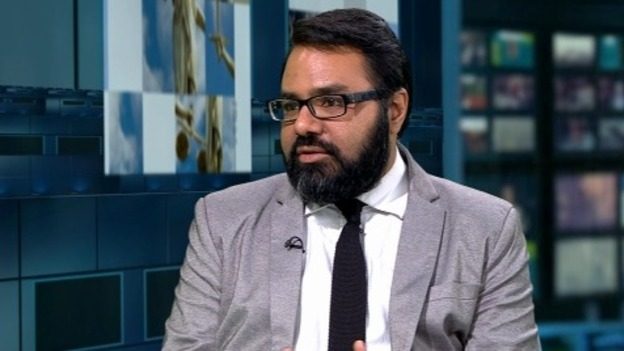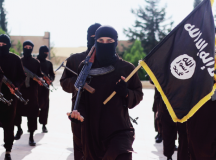Shiraz Maher is the author of Salafi-Jihadism: The History of an Idea (Hurst, 2016) and Deputy Director at the International Centre for the Study of Radicalisation at King’s College London. His mapping of contemporary Salafi-Jihadism was presented to a Fathom Forum on 28 July 2016 and ranged over the three forms it takes today (quietist, reformist, jihadist), its non-normative interpretation of the foundational concepts of Jihad, Takfir, Tawhid, al-wala wal-bara, and al-hakimiyya, and the origins of contemporary Salafi-jihadism in the post 9/11 conjuncture. Maher also responded to questions from policy-makers and opinion formers.
The recent attacks across Europe, particularly in France and Germany, have prompted the question: which ideas are motivating the attackers? To answer that question, the study of Salafism is now essential. A tradition or practice within Sunni Islam, Salafism is really about one question: how to live the most authentic life I possibly can as a Muslim. In the Hadith, we find the Prophet Mohammed being asked ‘Who are the best Muslims?’ He answered, ‘the generation that are with me’. When he was asked who the next best are, he replied, ‘the ones after them’. So the generations of Muslims who were living with the Prophet, or within living memory of him, are collectively known as the ‘Salafists’; the pious predecessors. And they are taken as models of authenticity, purity and of the best practice of Islam, and should be emulated. Salafism as a practice has grown quite a lot over the last two decades in Western Europe, particularly in the Netherlands, Germany, and north-Western Europe in general, as well as the UK.
Three Forms of Salafism
Today, Salafism has become largely conflated with terrorism in much public discourse because of what we’ve seen in Syria and Iraq. In fact, Salafism is a very broad tradition within which we can identify three trends.
The first group, in which we find the vast majority of Salafists, actually, are quietists. They believe in education and purification – i.e. learning more about their faith and purifying their practice of the faith. They are basically no threat to you or me, and not really that concerned with society. Instead, they are concerned with themselves, their families, and their communities. They do not emphasise change, especially radical change. We can see manifestations of that approach in Saudi Arabia.
The second group are the political Salafists who do engage with the state system in order to promote political reform. We saw this group coming to light after the 2011 Arab uprisings. For example, in Saudi Arabia an individual called Saman al-Odeh wrote to the Saudi King to say that while he was counselling people against protesting in public, at the same time the government had to give the people reforms. If it didn’t, he warned, the social fabric would unravel. The political Salafists see rights and responsibilities on both sides, and they prefer evolution to revolution.
The third group are the Jihadists. They are rejectionist in nature, oppose the domestic structures of the state as well as internationalist structures, and seek a radical and violent millenarian upheaval. This is the smallest group of the three, but it has been dramatically empowered recently, and is attracting some people as a result of its supposed success in carving out a piece of land between Syria and Iraq which it calls the Islamic State (IS), i.e. the Caliphate.
Five Ideas of Salafi-Jihadism
What I ask in the book is ‘What are the defining ideas of this Salafi-Jihadist movement?’ I argue that there are five defining ideas of Salafi-Jihadism: jihad, takfir, al-wala wal-bara, tawhid, and al-hakimiyya. These ideas exist within normative Islam, of course – there is nothing new here. But what is interesting is how the Salafi-Jihadists interpretation of these ideas is radically different to normative Islam. Let’s look at each idea and each interpretation.
Jihad
Salafists have made jihad into the pinnacle of Islam. They say it’s the highest form of duty and obligation and also that it’s an act of worship, a ritualistic act like praying, fasting, and giving charity. You must engage in jihad. And for the Salafi-Jihadists, jihad is a process of fighting, the very means to give Islam power and legitimacy in the physical realm.
Takfir
Takfir is the process of excommunication. Its function is to keep the faith pure, guarding the faith from an insidious weakening from within. Thus, if someone interprets ideas or practices in a particular way, you can label this person an apostate to push them away. For the Salafi-Jihadis, takfir is used to guard their ideological purity. It was also used to licence violence against apostates. It has been invoked in the sectarian conflict against the Shia in Iraq since 2003 and in Syria more recently, against the Alawites. When Abu Musab al-Zarqawi led Al-Qaeda in Iraq in 2003 he really developed the concept of takfir. He gave it primacy. Even more than the fight against the Western coalition, it was the fight against the Shia that was prioritised.
Al-wala wal-bara
Al-wala wal-bara is the most interesting of the concepts. It means loyalty and disavowal, love and hate, and it first emerged as a notion of ritual by which the early Muslims distinguished themselves from the non-Muslim tribes by physical and ritual difference – growing beards, holding different festivals or doing Eid. But it changed and became politicalised in the late 19th century under the first and second Saudi states, before the creation of the third, which has endured. It began to mean: do not fight us, but work with us; give your loyalty to us and your disavowal to the other warring tribes. Al-Qaeda, in the post-9/11 climate, becomes the first non-state group to demand loyalty from other groups on the al-wala wal-bara concept. Just last night I was watching an interview with ‘Jihadi Jack’ – an English convert from Oxfordshire who has gone out to fight in Syria. He wrote a Facebook post in Arabic stating he had disavowed his parents because they didn’t believe in Islam anymore.
Tawhid
All Muslims believe in tawhid of course; it is the single most important factor in Islam. So for me to put it in a book on this subject required me being very clear that I was concerned with how the Jihadis have understood this idea. The Jihadists say that the good Muslim has to try and find and live out the full meaning of tawhid in all of its complexities. So they ask: ‘How do you demonstrate your devotion and belief to God in every way? Yes, you have your ritualistic obligation and demands – you pray, fast, give charity because God commands it’ – they say, but ‘don’t Muslims also believe that when God started the process of creation he listed everything that would happen, and one of the things that is fixed is the point at which each soul will die – that the time of your death is fixed’? So, says the Jihadist movement, ‘How can you demonstrate your belief in this concept? Well, if you really believe in it you would come to the battlefields in Iraq and Syria and fight, because you are just as likely to die on your way to work next week in London if that was your moment, as you are on the battlefield.’ In other words, going to Syria or Iraq will not shorten your lifespan, if you really believe. In other words, anyone who doesn’t fight jihad cannot realise tawhid in its full conception.
Al-hakimiyya
The fifth idea is al-hakimiyya, or Islamic governance. Different Islamic theorists and movements have envisaged Islamic statehood in different ways, but what is interesting about the contemporary Jihadist movement is that it writes least about this idea. The theorists began discussing this idea a century ago, and it’s very broad – people buy into it in different ways, from the ‘liberal’ Islamist end to the IS model. So, they do not feel the need to convey this idea so strongly – it’s already had a degree of popular purchase in the region.
The real genesis of traditional al-hakimiyya comes from the Indian subcontinent and the Free India movement which was gathering momentum, and in which Muslims played a large role. Mawdudi began to theorise Islamic governance, and his ideas were then translated into Arabic and influenced Sayyad Qutb, who popularised them within the Arab context. And this change – from one geographical location, culture and practice of Islam to another – made al-hakimiyya a different idea of course.
Salafi-Jihadism as modern phenomenon
Salafi-Jihadism is a very modern phenomenon. These five ideas coalesced into the violent form we recognise today as recently as 2003. War has been the driver and the catalyst for the rise of Salafi-Jihadism. Syria and Iraq are of course the most important crucibles of the Jihadist impulse today
IS does not produce large interesting theological works but rather administrative documents and manuals about governance and the structure of the state. When the Jordanian pilot was burnt alive, for example, we scrambled around for ages trying to find some sort of document that would explain and justify what had happened, but we could only find one paragraph justifying the action. If Al-Qaeda had carried out the attack, it would have produced a 30-page booklet. Al-Qaeda has always tried to locate itself within religious tradition, relating its own actions to revered scholars from Islamic antiquity, particularly from the Salafi tradition such as Ibn Taymiyya and Abd al-Wahhab. Al-Qaeda wants to link its action to this chain of scholarship. This does not make them right or valid, of course, but my point is that’s how they saw themselves and that’s how they have tried to frame their actions. IS doesn’t do any of that, and in that it is very new.
Ideological and theological change will come out of this conflict in Syria. In my opinion, we can already see a more ‘pragmatic’ approach from Al-Qaeda in Syria. If you look at the areas it governs in Idlib Province you find a lot of discussion about the suspension of the Hadud – specific punishments within the Koran. Al-Qaeda has created a theological pragmatism to justify the suspension, and that is very interesting because we would never have seen that approach from Al-Qaeda in 2003. So it’s on a journey of sorts. But they are not doing this because they are moderating; they are doing this because they begun to understand the need to win public opinion for their cause. And it also allows them to message to the Arab and Muslim world that it is IS who are the extremists, not them.
Question: What attracts Muslims to IS?
Shiraz Maher: I think it’s the fact that IS seems to have success. How do you choose which group to join when you get to southern Turkey? Everyone wants to be part of the winning team. Also, IS understands branding better than anyone else. They were the first ones to think about their soldiers having the same kit, and featuring them in dramatic videos, so they looked like a real army.
Al-Qaeda has always operated in more abstract fashion: ‘The West is at war with you and there are these important ideas you need to understand in order to fight it.’ It emerged from an ideas space, it didn’t have an institution behind to motivate people. IS has some form of statehood, some enclaves of power, and can claim the title of the Caliphate, so its recruitment is different.
Also, don’t forget that while we see only the ultraviolence on our TV news, the vast majority of IS’s output is actually North-Korean style propaganda – images of schools, factories, and markets. IS’s propaganda can operate in a slightly different fashion because of its Caliphate.
Question: You use the term Jihadi and Jihadists to describe terrorism and terrorists. From both a philosophical and tactical point of view, how wise is this? Are you not giving legitimacy to terrorists by giving them the title ‘Jihadists’? It should surely be a concept in the arsenal of Islam used to fight against terrorism?
SM: This is something I considered a lot actually. I made it very clear in the book that I’m not making a value judgement about ‘good’ or ‘bad’ theology. Clearly I have my views, but I had to come at this with dispassionate objectivity. Jihadism is a linguistic meaning – it has different meanings to different people – but as far as this movement is concerned, the legal meaning is always to fight and to kill. That’s their understanding. I give them their due by saying this is how they see it. I try to counter this a little bit by showing the intra-Salafi debate, but if I were to saying that IS are not Jihadis, then I would be in the realm of polemic and opinion, not academic discourse.
Question: You mention the lack of an IS doctrine. Do you think that is due to a lack of conviction about their theoretical direction?
SM: I don’t know why IS has this lack of theology. We’ve had to speculate about it from the outside. They clearly have a process of indoctrination for their own recruits, but it’s not that well known and it seems there is nothing being used that is unique to terrorist purposes. For example, they use a book called kitaab al-tawhid but Muslims all over the region use it to explain the oneness of God. There’s nothing about it that is unique to terrorist purposes.
One possible reason is that they believe in Abu Bakr al-Baghdadi as the sole executive leading a caliphate. Yes, he can have an advisory council, but it is nothing like a parliament where there are votes and so on. The caliph is the man who makes the call, and all executive authority power resides in him. Provided he picks an opinion from within Islamic scripture, even if it is esoteric, even if it comes from a minority standpoint, you go with it. But I could also be completely wrong. We are just speculating here about why they do not have a more elaborated doctrine. It is very interesting though, that they don’t.
Al-Qaeda is really the group to watch in Syria. Their people are the ones producing doctrine still and they are coming at it in a more interesting fashion. Something I sometimes do with my students in seminars is to ask whether we should talk to Al-Qaeda in Syria. If Al-Qaeda are undergoing a process of theological reform – even if it is for purely political reasons, softening their positions to gain public approval or acquiescence – could we use this as an opportunity to try and shove them into a more moderate space? As you can imagine, that is one heated debate. If I’m wondering how to fill the hour, I give them that question!
Question: What makes a person move from being a supporter of the ideas of IS to taking the matters into their own hands? How does that work?
SM: Even within Salafi-Jihadi circles, to go to the IS position is still much disputed. For all of its barbarism and nihilism, Al-Qaeda still had scholars within it. The learned people within its ranks weren’t necessarily operational, but they were part of the ecosystem of Salafi-Jihadi thought. People like Abu Qatada, Abu Mohammed al-Maqdisi, or Abu Basir al-Tartusi. For them, IS has gone well beyond the pale. They refer to IS as khawarij. It’s a very loaded terminology that, to describe a movement like IS as khawarij. So, even if you’re quite a radical Salafi who is jihadi inclined in the West, there is this body of opinion that you respect that is pushing you away. That’s why the people who are going in to IS seem to come from this more stop-start position. It is harder to radicalise people who are already established in one religious tradition because they have counter-arguments. It is easier to get someone who is a blank canvas and suck them in.
How is this then translated into action – like the beheading of a priest for example? Well, one of the things we’ve come to understand in the last few months is that terrorism doesn’t have to be very sophisticated. In the past, if I was a young man in Bradford, who was into Jihad and something like 7/7 happens and I think this is a great act, and I want to emulate it, it’s not so easy. I have to go recruit people. I have to learn how to build a bomb. There are all these barriers – technical as well as emotional, that may stop me getting to the point of action. What has been so clearly demonstrated is that now you can just go get a knife, or hire a truck, to wreak havoc and devastation. It’s the simplification of terrorism. Getting your car and ramming someone has been well established in the Israeli-Palestinian conflict for a long time, but it had not yet translated into Europe. Unfortunately, I think we’re well into it now in Europe, mainly because of the demonstration of success by these people who rely on their lack of sophistication.
Question: Is there a place for the theological community to dissuade people before they make that jump, to play more of an outward-facing role?
SM: Theology does play a role. It is important to tackle the ideas, even though not every person on the ground understands them. But there is also a need to push IS back now. What gives ideas their traction is success and momentum. IS has momentum so for a time we will watch the flow of foreign fighters from Europe going into the conflict in Syria. You can see these spikes in recruitment after dramatic moments like the capture of Mosul, or the declaration of a caliphate. That was a really unique moment: it was so brazen to see him do that. I remember being at the BBC discussing it with Abu Rumaysah and I said, ‘If you believe in it, why don’t you go?’ And about 10 days later he turned up in Syria! That guy did actually walk the walk. He thought, ‘If I believe in all this, then I have to go.’ I think this was true for many people who went. So the way to defeat the idea is to crush IS.
What I find staggering, is that when I talk to the Europeans who have gone out to fight they say about Qatada, Maqdisi, ‘these guys have gone soft, they have sold out’. They are no longer hard-core enough for them! And this is because they think they are standing with a movement that has success and momentum. So we can crush the idea by crushing its physical manifestation.
Question: What messaging is effective in preventing recruitment?
SM: Once they’re out there, it’s all too late. What provokes them to think again? Not the horrific treatment of the Yazidis. None of that really matters to them. Killing other Sunni Muslims does though. Some of them think, hang on, I came here to fight Bashar al-Assad. What prompted the returnees to start to disengage and leave was when suddenly they were killing other Sunni Muslims. Unfortunately, not much else seems to matter. You can rape Yazidis and they won’t think twice, but killing other Sunni Muslims is what gets them.
Question: During the troubles in Northern Ireland, around 35-40 per cent of people were nationalist and wanted an Irish Republic. A small minority of those, the Irish Republican Army (IRA), were violent. However there was a continuum. Even some of those who didn’t support the bombing, still had some sympathy for the IRA cause, as they were trying to promote the ideas that lots of people held, even if only loosely. Is that comparable?
SM: You don’t see that in the same way with IS. IS is unique in that it revels in its barbarism. People are not prepared to go out and make arguments for IS. I keep up a dialogue with interesting Islamists in the UK – thoughtful guys who clearly have strong Islamist beliefs. They really struggle with IS bringing back slavery. They say that it may exist in Islamic scripture, but you shouldn’t bring it back into the modern era. While Al-Qaeda in a sense had some of that kind of muted sympathy when it was fighting its wars, this is less the case for IS.
Question: You were talking about IS military success playing a key role in their recruitment. However, do potential recruits care about IS losing territory in Iraq and Syria when they are increasing their attacks elsewhere, notably in the West?
SM: Global terror attacks, particularly when they happen in the West, in France, Germany and Orlando, are very important for IS, absolutely. By contrast, Al-Qaeda is not so concentrated on global attacks right now. It felt that in 2003 it had a unique opportunity and squandered it in Iraq. Now, it has Syria where, unlike IS, it has pockets of popular support, or at least acquiescence to what it is doing. I think they’ll want to concentrate there and keep trying to take territory. The biggest mistake al-Baghdadi made was starting a fight with the world. If he had concentrated on what he had, then he was on to something. But now that he has provoked the ire of the world, IS will certainly face the consequences of that. Al-Qaeda has realised that.































‘IS is unique in that it revels in its barbarism’ – a false and moronic statement. So do hamas, fatah, hezbullah.
RE ‘ ramming someone has been well established in the Israeli-Palestinian..’ – more accurate to say, of course, that arabs ram Jews but no Jews ram arabs.